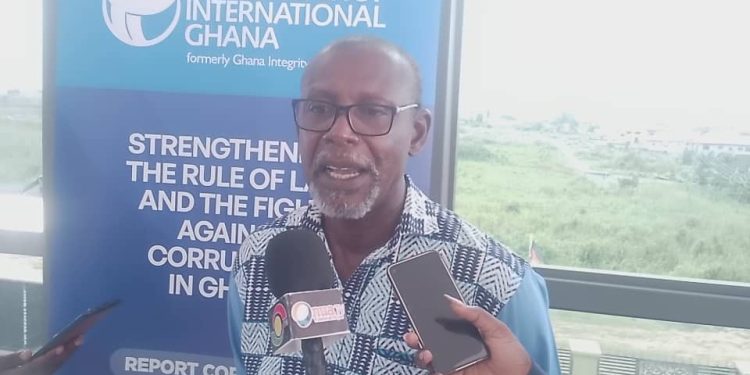Transparency International (TI) Ghana is calling for a ruthless fight against what it describes as the growing instances of sextortion demanding that the corrupt act perpetrated predominantly against women is made a high crime.
The Anticorruption institution opines that reforming the laws of the country to capture the severity of the act and the accompanying punitive measures will deter predators from demanding sexual favors from women seeking public services or accessing opportunities.
Speaking at an engagement of Civil Society Organizations and selected Media personnel in Kumasi, Fund raising manager of TI Michael Boadi expressed worry that the repugnant conduct continues to widen already existing gender inequalities depriving women of attaining their economic, social and political potentials.
Though studies we have done have shown that corruption affects women negatively more than men, corruption has not been fought with the conscious effort to deal with inequalities that corruption perpetrates on women and the vulnerable. So while we do general advocacy against corruption, it gets to a time when we have to zoom in to specifics
“If we want to deal with corruption in accessing services and the illicit activities and immorality around it, we must deal with sextortion. It is bribery where the object of exchange is sex instead of money. Many men pray on the vulnerabilities of women knowing very well that their priced assets is their sexuality,” he explained.
Sextortion as a Human Rights violation
The anti-corruption campaigner argued that perpetrators, usually men who abuse entrusted power, authority and influence were trampling on the human rights of women and destroying the moral safeguards of society.
Mr. Boadi further warned that Ghana’s Affirmative Action and Gender Equity Laws passed in the year 2024 to ensure women are accorded wider participation in governance, leadership and economic opportunities, will yield little results if women have to deal with significant financial and sextortion barriers while seeking jobs or vying for leadership positions.
He pointed out that several women continue to suffer in silence for the fear of victimization and the fear of suffering greater injustice when they report perpetrators who happen to be persons with power.
The Chief Executive of the Juaben Municipal Assembly, Eunice Ohenewaa Ansu who graced the occasion underscored the need for the empowerment to trickle down all public institutions to dictate a paradigm shift and create safe spaces for women to thrive.
Sextortion at Ghana’s Borders
Michael Boadi charged journalists to take keen interest in investigating reports of women facing persistent sextortion at Ghana’s landed borders where traders complain of officials requesting sexual favors to allow their goods entry without stringent checks.
“A lot of complaints have come from the borders where traders especially from Togo and Burkina Faso that certain officials demand sex as a unit of payment for bribes before they allow them to pass with their goods. I will encourage the media to take this investigation up. When you find unscrupulous men anywhere service is offered, they will always want to take advantage of women,” he suggested.
PAIReD Project:
The workshop which aims at deepening the capacity of 720 CSOs and media personnel in identifying, reporting and advocating against corruption and its gendered underpinnings, formed part of the ‘Participation, Accountability, and Integrity for a Resilient Democracy (PAIReD)’ Project being undertaken in some 60 districts across the country.
Project Officer Osei Bonsu Anin stated that the two-year project being implemented by Transparency International with its partners, GIZ, BMZ, and the EU, is expected to empower society particularly women and youth to be assertive in fighting corruption and its disproportional toll on women.
Participants were taken through the various conceptualization theories around corruption, its manifestations in society and the intersections between corruption, gender and development.
They were enlightened about how corruption relative to overpricing of services, vote buying and diversion of resources could have a bearing on maternal mortality, exclusion of women from leadership and decision making as well as its potential to further worsen the plight of the poor and vulnerable in society.
By: Ivan Heathcote – Fumador.



































































